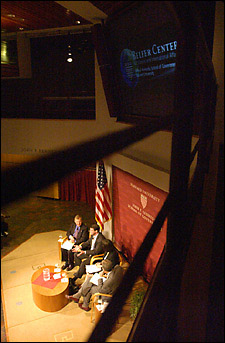KSG panel takes on Iranian nuclear challenge
Iran is building nuclear weapons, now what?
Is Iran’s nuclear program a hazard to the international community? And if so, how should the problem be addressed? Those questions were posed to a panel Tuesday night (March 15) at the Kennedy School of Government.

On the first point, the panelists were in agreement – Iran’s assertion that it will use nuclear technology for only peaceful means is suspect.
“I wish it weren’t so, but Iran is obviously running a nuclear weapons program,” said Brenda Shaffer, research director of the Kennedy School’s Caspian Studies Program. By its own admission, Shaffer said, Iran has been in violation of the Nuclear Nonproliferation Treaty for 18 years. “They don’t call it a nuclear weapons program. But you wouldn’t hide the things you are importing if you don’t have a nuclear weapons program.”
The panel agreed there is widespread support throughout Iran for moving forward with nuclear technology – for military purposes as well as for national pride – and that a regime change won’t alter that sentiment.
What is so bad about Iran having a nuclear bomb?
“In that region there are others that have this aspiration,” said Ashton Carter, professor of science and international affairs. “So if you let that domino fall you have to wonder where it goes.”
Carter reminded the audience that once nuclear material is made it remains dangerous for thousands of years.
“Once it’s in humanity’s hands, it’s going to be there through many turns of history’s wheel,” said Carter. “So who gets it next? Some future government? Is it sold? Is it diverted?”
Shaffer related Carter’s concern specifically to Iran.
“Imagine if the regime changes. Remember after [Saddam Hussein was driven from power in] Iraq, we had looting,” she said. “Imagine a situation like that in Iran where we have no control over the uranium and plutonium being produced. We don’t know where it is. Even most of the Iranian government members don’t know where it is.”
See a video archive of the event
Henry Sokolski, executive director of the Nonproliferation Policy Education Center and a former deputy at the Defense Department, believes the international community should be tougher with Iran for breaking the nonproliferation treaty.
“If Iran succeeds in getting people convinced that they have a right under the rules to get up to the edge of having a nuclear arsenal, and, in addition, they can withdraw with impunity like North Korea did, you are going to find everyone in the neighborhood emulating Iran,” he said.
What is the prescription to remedy the current crisis? Iran has agreed to a voluntary temporary ban on its work toward nuclear capability while it engages in negotiations with European leaders. And the Bush administration now seems willing to offer incentives to make that temporary ban long-term, a strategy Carter thinks is worth pursuing.
“What you really are talking about is trying to hold the problem off until another day comes when we have a different kind of relationship, they have a different kind of government, and a people that says on a whole we have other fish to fry than nuclear weapons and nuclear power,” Carter said. “That’s probably the best you can hope for.”
The forum was moderated by Graham Allison, director of the Belfer Center for Science and International Affairs, which was a co-sponsor of the event.




